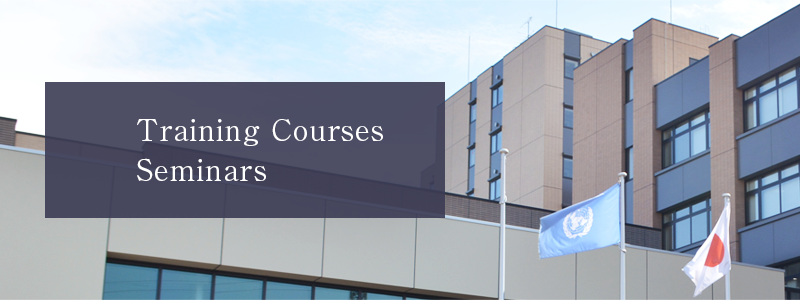Messages from alumni
The contents of this page consist of essays by alumni focusing on their lives after UNAFEI’s training courses.
| Name | Country | Course No. | Essays |
|---|---|---|---|
| New !! Ms. Lilian Akinyi Otieno |
Kenya | The 174th International Senior Seminar | A great impact of UNAFEI’s seminar on my career (PDF: 115KB) |
| Mr. Gilbert Drilon Peremne | Philippines | The 148th International Training Course | DRUG OFFENDER TREATMENT: NEW APPROACHES TO AN OLD PROBLEM (PDF: 330KB) |
| Ms. Ana Cristina Bandeira Lins | Brazil | The 174th International Senior Seminar | How UNAFEI inspires my career (PDF: 216KB) |
Ms. Lilian Akinyi Otieno (Kenya)
from the 174th International Senior Seminar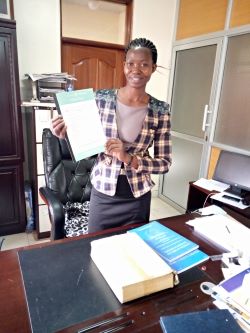
UNAFEI’s training seminar has had a great impact on my career. My experiences meeting Volunteer Probation Officers (VPOs) in Japan are helping me in engaging the VPOs in my country who are very crucial in my work, especially with the COVID-19 pandemic, which came with lock downs hindering free movement in visiting offenders’ homes. Since VPOs live near the homes of offenders, they are able to reach them and help in working towards achievement of offender treatment plans and preventing reoffending.
Additionally, I am happy to share the good news that I have been promoted from Senior Probation Officer to Principal Probation Officer. I am highly motivated at work, and I have brought UNAFEI’s training materials to the attention of my fellow officers to read and gain knowledge. In a competitive promotional interview, I was able to explain my contribution to the Department: I represented the Department successfully in the 174th International Senior Seminar in Japan. While in Japan, I learned a lot about the importance of professionalism, and I was so smartly dressed in the business suit I bought in Tachikawa with the help of Miya-san, one of the Japanese participants.
I express my heartfelt gratitude to JICA and UNAFEI for the life changing training which has highly impacted my career and my professionalism.
Mr. Gilbert Drilon Peremne (Philippines)
from the 148th International Training Course
One of the best journeys that I considered in my career as a Jail Officer and member of the Bureau of Jail Management and Penology (BJMP) for almost 28 years now is to be one of the participants of the 148th International Training Course, which was conducted by the United Nations Asia and Far East Institute (UNAFEI) way back 11 May up to 17 June 2011 in Fuchu, Tokyo, Japan.
Although there were two slots slated for the Philippines that time as sponsored by the Japan International Cooperation Agency (JICA) and Asia Crime Prevention Foundation (ACPF), but I was the lone representative of my country joining with 17 other participants, whom eight were from Japan, three from Thailand, two from Maldives, one from South Korea, one from Indonesia, one from Sudan, and one from Afghanistan. We were divided in two groups and in Group 2, I was the designated Rapporteur. Our group was tasked to come-up with an output on Effective Interventions for Drug-Dependent Offenders.
My over-all stay, from day 1 until the completion of the course, was indeed memorable in terms of experiences and productive in terms of learning. I appreciated the Japanese Culture of caring their guests and visitors in various occasions and settings. The training course was conducted and facilitated very well by offering various facets of exposures such as in classroom, field visits and educational tours. Notable to mention that contributed to the success of training were the entire UNAFEI Staffs - from the Director to assigned Advisers and down to Kitchen/ Mess Hall Attendants, including Interpreters and Representatives from JICA.
The Theme of the 148th International Training Course was “Drug Offender Treatment: New Approaches to an Old Problem.” It was very relevant to my job as a Jail Officer. The main idea of pursuing this particular theme was well articulated by no less than Tatsuya Sakuma, the Director of UNAFEI during that period.
With notable inputs from the following: Anne Bergenstrom, Visiting Expert from United Nation Office on Drug and Crimes (UNODC); Country-Study Reports presented by other co-participants; lectures from in-house UNAFEI Professors; and Resource Speakers from various prestigious universities and organizations in Japan – I was able to learn more information about Therapeutic Community; Cognitive Behavior Therapy and various models in the effective treatment of drug-dependent offenders. Various resource materials were also provided to be used as guide and reference.
In applying all my learnings for the benefit of drug dependents or persons with stimulant dependency, my Team under my supervision and direction crafted a Manual on Specialized Psychological and Emotional Component Sessions (SPECS). This was utilized for almost a decade already in 38 jail units under our operational jurisdiction and benefitted more than 2,000 Persons Deprived of Liberty (PDL) already.
The SPECS Program are series of 12 gatherings that provides a structured approach for individual or offenders with dependency on stimulant drugs and detained in our jail facilities. This is being handled by a professional Counselors.
At present, in close coordination with the Philippine Drug Enforcement Agency (PDEA) in Western Visayas Region, Philippines, the SPECS Program is also offered in BALAY SILANGAN Projects, which were established by various Local Government Units (LGUs) and benefitted hundreds of mild drug users who seek support from the community for their treatment and rehabilitation.
This innovation of the BJMP Regional Office VI SPECS Team is our contribution to the government’s relentless effort in addressing drug problems.
Hereunder is shared pictorial:
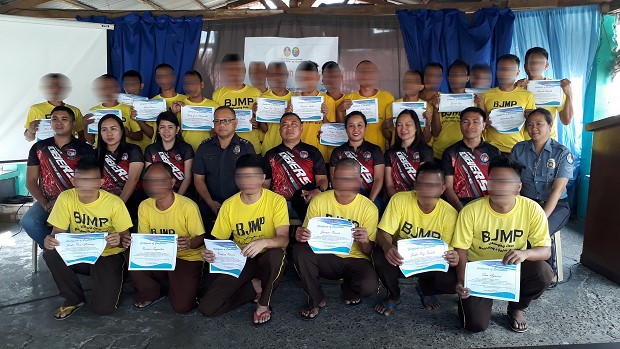
In the first and third rows are Persons Deprived of Liberty (PDL) who completed the Specialized Psychological and Emotional Component Sessions (SPECS) Program in tableau with the Program Implementers and Staffs of Metro Bacolod District Jail Male Dormitory Annex, Bacolod City, Philippines (all in the third row). In the middle of second row is Jail Senior Superintendent Gilbert D Peremne, participant of the 148th International Training Course.

In the first and third rows are Persons Deprived of Liberty (PDL) who completed the Specialized Psychological and Emotional Component Sessions (SPECS) Program in tableau with the Program Implementers and Staffs of Metro Bacolod District Jail Male Dormitory Annex, Bacolod City, Philippines (all in the third row). In the middle of second row is Jail Senior Superintendent Gilbert D Peremne, participant of the 148th International Training Course.
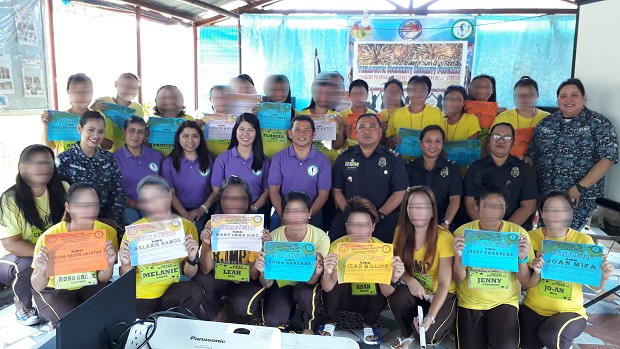
In the first and third rows are Persons Deprived of Liberty (PDL) who completed the Specialized Psychological and Emotional Component Sessions (SPECS) Program in tableau with the Program Implementers and Staffs of Metro Bacolod District Jail Female Dormitory, Bacolod City, Philippines (all in the third row). Sixth from left in the second row is Jail Senior Superintendent Gilbert D Peremne, participant of the 148th International Training Course.

In the first and third rows are Persons Deprived of Liberty (PDL) who completed the Specialized Psychological and Emotional Component Sessions (SPECS) Program in tableau with the Program Implementers and Staffs of Metro Bacolod District Jail Female Dormitory, Bacolod City, Philippines (all in the third row). Sixth from left in the second row is Jail Senior Superintendent Gilbert D Peremne, participant of the 148th International Training Course.
Ms. Ana Cristina Bandeira Lins (Brazil)
from the 174th International Senior Seminar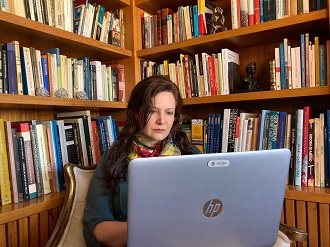
In one of my first lessons at the UNAFEI 174th International Senior Seminar, about “Prevention of Reoffending and Fostering Social Inclusion”, Professor Takuya Furuhashi introduced his speech with the quote: The mediocre teacher tells. The good teacher explains. The superior teacher demonstrates. The great teacher inspires. After wonderful five weeks of intense learning in Japan, I must recognize: UNAFEI does inspire!
In Brazil, although we were for 40 years one of the pioneers countries with a very modern penal legislation - a fact reemphasized by the Tokyo, the Nelson Mandela and the Bangkok Rules - the practice is still very archaic. Since the 1980s, our penal laws aim primarily, rather than at punishing, at reintegration of the convicted into society, and also foment non-custodial measures instead of imprisonment. Despite various instruments of non-prosecution and alternative non-custodial measures and penalties, applicable to the great majority of the criminal types, the country still has the world's third largest prison population, 30% of which are pre-trial detainees. We have the 21th highest prison population rate - 357 per 100,000 inhabitants, based on a population of 211.8 million1. Just in 2019, there were 395,470 new penal execution procedures (after criminal conviction), 58% of which established imprisonment as penalty2. Besides that, conditions in our penal institutions are generally very bad due to overcrowding and threat or violence from crime syndicates inside the facilities. Instead of being a way to reintegrate inmates in society, prisons work, in the words of the leader of a major criminal organization, as “a fabric of its new members”.
At the seminar, we were exposed to many successful criminal policies that contribute not only to a general reduction of crime rates, but also prevent reoffending and foster social inclusion of prior criminals. Evidences of the better cost-effectiveness (for the criminals and for the society) of non-custodial measures, in comparison to prisons, were showed by the visiting experts Dr. Matti Jousten (criminologist) and Ms. Jana Spero (Ministry of Justice in Croatia). The advantages of not even prosecuting or executing sentences were highlighted by Prof. Machiko Watanabe and Prof. Hidehito Hosokawa. The importance of a program that follows the reinsertion of offenders into society and its challenges were well illustrated by Prof. Mika Kitagawa and Prof. Hiroyuki Watanabe. Some creative policies to help reintegration after prison were also explained, such as the “Volunteer Probation Officers” and “Hello Work” of Japan and the “Yellow Ribbon Project” of Singapore. The Group Workshop Sessions were very effective to discuss and deepen that information and to exchange individual experiences with the participants. Visits to correctional institution, probation office, half-way house and the museum of police force also opened our minds for good alternatives of criminal policy.
Back to my home country, I immediately decided to change my work specialty. As a Federal Prosecutor, I left the highly coveted area of international corruption and financial crimes and voluntarily chose to work at the least disputed task at the Federal Prosecutors Office in São Paulo, which is not only responsible for the investigation and prosecution of diverse federal crimes, but also is majorly in charge of procedures following conviction.
In Brazil, we do not rely on a probation service with power of decision. After hearing the legal opinion of a prosecutor, or by his provocation, it is always the role of the judge to decide, for instance, which type of prison the convicted will be sent to, substitution for non-custodial measures, paroles, and final releases.
With all I have learned at UNAFEI, in this new task I do prioritize not only to substitute jail for non-custodial measures, but also to tailor them individually for each offender, in order to promote his/her social inclusion. Those measures, often combined, include: the development of skills for a new occupation; the conclusion of high school or university; community service based on the convict’s abilities (a measure that highlights his/her qualities in a positive environment); and occasional psychological therapy (depending on the type of offense).
In addition to that, I have also volunteered to represent the Public Prosecutor’s Office at the Sao Paulo State Penitentiary Council. This is a Council composed by representatives from the Public Prosecutor’s Office, public defenders, criminal lawyers, psychologists and psychiatrists, as well as all directors of the correctional facilities in the State. Its primary attributions are to discuss penitentiary policies and inspect facilities, to assure that prison rights are being observed. At that Council, I have chosen to integrate a work team that will try to improve possibility of work and education in correctional facilities. Despite being a right of convicts, only less than 20% get access to work or study while incarcerated in the State, which holds today more than 215,000 prisoners.
The great relationship among the seminar participants also creates a good international network, in which we keep exchanging information and experiences about not only the Seminar theme, but also on other relevant justice matters. To take part in a UNAFEI Webinar is also a great way to keep learning and contributing with its aims. My plans of diffusing and debating all I have learned in the school of Prosecutors and Judges are unfortunately delayed by the Covid-19 Pandemic. Nevertheless, I am preparing right now a presentation for the Federal Prosecution Service Podcast, which is followed not only by criminal justice authorities, but also by many law students.
With all that, I hope to well implement and spread what I have learned, in the hope of contributing for a peaceful and inclusive society. I am extremely grateful to the Japan International Cooperation Agency (JICA), the Asia Crime Prevention Foundation (ACPF), and UNAFEI, for the privilege of being inspired by such a great experience!
1 https://www.prisonstudies.org/country/brazil
2 “Justiça em Números 2020”, available at https://www.tjce.jus.br/wp-content/uploads/2020/08/jn-2020.pdf





